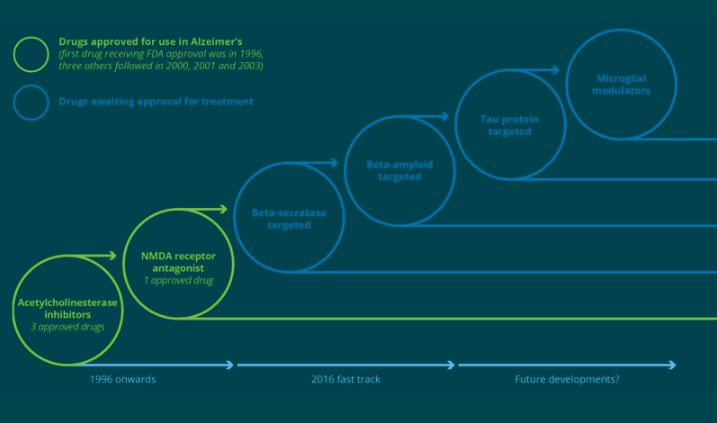In the late 1970s, Earth, Wind & Fire released one of their biggest hits – September – with an opening line that has become an internet meme and is widely recognised around the world.
"Do you remember the 21st night of September?"
Fast forward to today, an important date in the calendar for the millions of people suffering from Alzheimer's disease and other forms of dementia. The 21st of September 2018 is World Alzheimer's Day, an important opportunity for raising awareness and highlighting many of the issues that people suffering from dementia face every day. The theme of this year's campaign is 'Unite against dementia' and how, by working together, we can overcome many of the challenges those with dementia face and allow those with dementia to live as well as possible.
Dementia is not a specific disease but a term that describes a group of symptoms associated with a decline in memory, thinking, behaviour and the ability to perform everyday activities. The World Health Organization characterises dementia into three stages, each of which are distinguished by a variety of symptoms (see Figure 1). It affects around 50 million people around the world – mainly older people, although it is not a normal part of ageing, as is believed by many. Nearly 60 per cent of those with dementia live in low and middle-income countries, and due to the world's growing and ageing population, there are nearly 10 million new cases every year. It is one of the major causes of disability and dependency worldwide among older people and has significant physical, psychological, social and economic impacts, not only on people with dementia but also on their carers, families and society.1
Figure 1. Stages and symptoms of dementia, which may or may not be present in all cases

Source: adapted from the World Health Organization, Dementia Key facts, 2017
Alzheimer's disease (AD) is the most common form of dementia and is believed to contribute to approximately 60 to 70 per cent of all dementia cases. Currently, there is no cure for AD, although various medication and management strategies may help to alleviate symptoms on a temporary basis. Little is known about the causes of the disease, but about 70 percent of the risk is believed to be genetic.2 Other risk factors are believed to be hypertension, depression, head injuries and more recent research suggests air pollution may be a factor in some cases. At the cellular level, AD is characterised by two main pathologies:
- amyloid plaques: the accumulation of protein fragments called beta amyloid that form plaques between neurons in the brain. Beta amyloid is broken down and eliminated in a healthy brain, but in AD the fragments accumulate to form hard, insoluble plaques
- neurofibrillary tangles: twisted fibres inside neurons that mainly consist of a protein called tau, which forms part of structures called microtubules that transport nutrients and other molecules from one part of a neuron to another. In AD, tau is abnormal and microtubules collapse, affecting molecular transport3
Consequently, many current drug development strategies focus on targeting either beta amyloid or tau, although with very limited results. In 2016, a clinical trial using a tau-based drug found that the drug reduced brain shrinkage by 30-40 per cent and resulted in improvements in memory and thinking tests compared to the control group. However, these promising results were only found in patients not taking any other medications for AD. This represented only a small subset of the trial population, so overall the trial failed to meet its goal, leaving a number of unanswered questions but also plans for further trials to confirm the initial results and determine optimal dosing.4
These potentially promising results follow many years of failures. We explored these failures in more detail in our report The future awakens: Life sciences and health care predictions 2022, in which we noted that between 1998 and 2014, 123 potential medicines for AD were halted in clinical trials, and just four medicines were approved (see Figure 2). In 2017, there were 87 potential drugs in development for AD in the US, including 16 in phase III clinical trials. Many of these potential drugs focus on the aforementioned amyloid plaques and neurofibrillary tangles, although others are aimed at decreasing inflammation in the brain due to AD or target the immune system to fight AD. Prevention of AD is also an important area of interest, and researchers are exploring gene mutations associated with AD.5
Figure 2. The search for a treatment for Alzheimer's Disease

Source: The future awakens: Life sciences and health care predictions 2022, Deloitte LLP, 2017
This historic lack of treatment to either halt or even cure AD, along with the sheer scale and impact of the disease on families, carers and the health and social care system, have contributed to the high cost of dementia in every health economy around the world. In the UK, a 2017 estimate put this cost at £23 billion per year,6 while in 2018 it rose to £26 billion per year. This is more than cancer and heart disease combined, yet research into dementia is often neglected, as only £90 per patient is spent on dementia research each year in the UK.7
However, the lack of new drug treatments and overall small amount of funding for dementia research is not all bad news. Recently there have been some innovative breakthroughs and new strategies around dementia diagnosis, raising hope that a cure could be found one day. In Japan, a new artificial intelligence-based diagnostic tool that utilises a series of questions and an on screen avatar has been developed to detect individuals in the early stages of dementia.8 Similarly, here in the UK, machine learning has been deployed to detect small vessel disease, one of the most common causes of stroke and dementia, which could be utilised to help clinicians administer treatments to patients more quickly in emergency settings and predict a patient's likelihood of developing dementia.9
Applying these types of new technologies could impact dementia diagnosis and treatment in the coming years. Similarly, an increased focus on developing new drugs for dementia could eventually lead to numerous breakthroughs that could limit the extent of the effects of dementia on the global population, so that eventually everyone can remember tonight, the 21st night of September.
In the UK, dementia awareness and understanding has come a long way. However, the stigmatisation and misinformation that surrounds dementia remain a challenge and, as we illustrate above, more research into this devastating disease is still needed. Between 2013 and 2016, we worked closely with the Alzheimer's Society, one of Deloitte's three main charity partners, to improve awareness and understanding of dementia. The Centre for Health Solutions also published a joint report - Dementia today and tomorrow: A new deal for people with dementia and their carers.10 Many Deloitte employees became Dementia Friends, including our Executive team,11 and we continue to support this most important of causes. So today, on World Alzheimer's day, we have dedicated our blog to updating our readers on developments in the fight against dementia and to remind everyone as to why we need to continue to unite and work together to raise awareness and challenge the common stigma that surrounds Alzheimer's Disease and other dementias.
Unite against dementia https://www.alzheimers.org.uk/get-involved/world-alzheimers-day
Footnote
1 http://www.who.int/news-room/fact-sheets/detail/dementia
2 https://www.ncbi.nlm.nih.gov/pmc/articles/PMC2664945/
3 https://www.brightfocus.org/alzheimers/infographic/amyloid-plaques-and-neurofibrillary-tangles
4 https://www.alzheimers.org.uk/disappointment-and-promise-tau-drug-trial
6 https://www.bmj.com/content/358/bmj.j2856
7 https://www.telegraph.co.uk/wellbeing/alzheimers-research/10-things-you-didnt-know-about-dementia/
9 https://www.imperial.ac.uk/news/186108/artificial-intelligence-improves-stroke-dementia-diagnosis/
The content of this article is intended to provide a general guide to the subject matter. Specialist advice should be sought about your specific circumstances.

